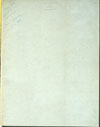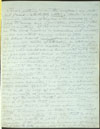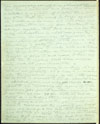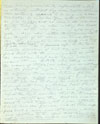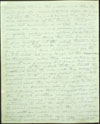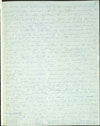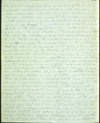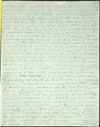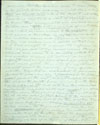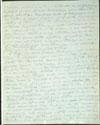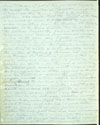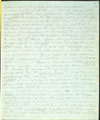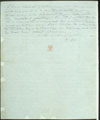Mahatma Letter No. 81: Difference between revisions
(→Page 7) |
(→Page 8) |
||
| (13 intermediate revisions by 3 users not shown) | |||
| Line 1: | Line 1: | ||
{{Infobox MLbox | {{Infobox MLbox | ||
| header1 = People involved | | | header1 = People involved | | ||
| Line 11: | Line 7: | ||
| writtendate = unknown | | writtendate = unknown | ||
| receiveddate = Autumn 1882 | | receiveddate = Autumn 1882 | ||
| otherdate = | | otherdate = unknown | ||
| header3 = Places | | header3 = Places | ||
| sentfrom = unknown | | sentfrom = unknown | ||
| receivedat = [[Simla, India]] | | receivedat = [[Simla, India]] | ||
| vialocation = | | vialocation = unknown{{pad|9em}} | ||
}} | }} | ||
''' | This is '''Letter No. 81''' in''' [[The Mahatma Letters to A. P. Sinnett (book)|''The Mahatma Letters to A. P. Sinnett'']], 4th chronological edition'''. It corresponds to '''Letter No. 52''' in '''Barker numbering.''' See below for [[Mahatma Letter No. 81#Context and background|Context and background]] and see also [[Mahatma Letter No. 82#Context and background|Mahatma letter No. 82]]. | ||
<br> | <br> | ||
<br> | <br> | ||
| Line 73: | Line 69: | ||
turns round, concealing admirably his rage and hisses and spits internally. Every time I contradict and prove him wrong, — whether in a question of [[Tibetan]] terms, or in any other trifle, the record he keeps against me swells, and he comes out with some new accusation. It is idle, my dear brother, to be always repeating that there are, nor can there be any contradictions in what was given to you. There may be inaccuracy of expression, or incompleteness of detail; but to accuse us of blundering is really too funny. I have asked you several times to make notes and to send them to me, but neither [[Allan Octavian Hume|Mr. Hume]] nor you have thought of doing it; and indeed, I have very little time to explore back letters, compare notes, look into your heads, etc. | turns round, concealing admirably his rage and hisses and spits internally. Every time I contradict and prove him wrong, — whether in a question of [[Tibetan]] terms, or in any other trifle, the record he keeps against me swells, and he comes out with some new accusation. It is idle, my dear brother, to be always repeating that there are, nor can there be any contradictions in what was given to you. There may be inaccuracy of expression, or incompleteness of detail; but to accuse us of blundering is really too funny. I have asked you several times to make notes and to send them to me, but neither [[Allan Octavian Hume|Mr. Hume]] nor you have thought of doing it; and indeed, I have very little time to explore back letters, compare notes, look into your heads, etc. | ||
I confess my ignorance, in one thing at any rate. I am perfectly at a loss to understand why the expression used by me with regard to [[Helena Petrovna Blavatsky|H.P.B.]]'s answer to [[C. C. Massey|C.C.M.]] should have so shocked you; and why you should object to my "exercising my ingenuity"? If, perchance, you give it another meaning than I do, then we are again both at sea — | I confess my ignorance, in one thing at any rate. I am perfectly at a loss to understand why the expression used by me with regard to [[Helena Petrovna Blavatsky|H.P.B.]]'s answer to [[C. C. Massey|C.C.M.]] should have so shocked you; and why you should object to my "exercising my ingenuity"? If, perchance, you give it another meaning than I do, then we are again both at sea — faute de s'entendre. Put yourself for a moment in my place, and see whether you would not have to exercise all the ingenuity you had at your command, in a case like that between C.C.M. and H.P.B. In reality, there is no contradiction between that passage in [[Isis Unveiled (book)|Isis]] and our later teaching; to anyone, who never heard of the | ||
{{Col-break|width=3%}} | {{Col-break|width=3%}} | ||
| Line 82: | Line 78: | ||
{{Col-break|width=30%}} | {{Col-break|width=30%}} | ||
'''NOTES:''' | '''NOTES:''' | ||
* '''faut | * '''faut[e] de s'entendre''' means "for lack of agreement". | ||
{{Col-end}} | {{Col-end}} | ||
| Line 156: | Line 152: | ||
* '''his famous article in The Theosophist''' refers to the article ''"C.C.M." and "Isis Unveiled"'' published in [[The Theosophist (periodical)|''The Theosophist'']] in Sept., 1882, pp. 324-326. Click [http://books.google.com/books?id=HonldmjaWK0C&pg=PA324&lpg=PA324&dq=%22C.C.M.+and+Isis+Unveiled%22+The+Theosophist&source=bl&ots=Cot2WJh2rd&sig=u9f7GRyUxcrjDRjsWzHSMwDZkPc&hl=en&sa=X&ei=lntMUYi_B8rN2QW304H4CA&ved=0CEkQ6AEwBA#v=onepage&q=%22C.C.M.%20and%20Isis%20Unveiled%22%20The%20Theosophist&f=false# here] to read the article. | * '''his famous article in The Theosophist''' refers to the article ''"C.C.M." and "Isis Unveiled"'' published in [[The Theosophist (periodical)|''The Theosophist'']] in Sept., 1882, pp. 324-326. Click [http://books.google.com/books?id=HonldmjaWK0C&pg=PA324&lpg=PA324&dq=%22C.C.M.+and+Isis+Unveiled%22+The+Theosophist&source=bl&ots=Cot2WJh2rd&sig=u9f7GRyUxcrjDRjsWzHSMwDZkPc&hl=en&sa=X&ei=lntMUYi_B8rN2QW304H4CA&ved=0CEkQ6AEwBA#v=onepage&q=%22C.C.M.%20and%20Isis%20Unveiled%22%20The%20Theosophist&f=false# here] to read the article. | ||
* '''Davidson''' refers to an ornithologist who worked for [[Allan Octavian Hume|A. O. Hume]] as a private secretary. | * '''Davidson''' refers to an ornithologist who worked for [[Allan Octavian Hume|A. O. Hume]] as a private secretary. | ||
* '''the Review of the The Perfect Way''' was anonymously published in two installments in ''The Theosophist'', in May and June 1882. | * '''the Review of the The Perfect Way''' was anonymously published in two installments in ''The Theosophist'', in May and June 1882. (Sinnett was its real author; see Letter No. 63). | ||
* '''"death dance" of the Maccabreans''' refers to the Danse Macabre or Dance of Death, a medieval allegory on the universality of death. | * '''"death dance" of the Maccabreans''' refers to the Danse Macabre or Dance of Death, a medieval allegory on the universality of death. | ||
| Line 194: | Line 190: | ||
{{Col-break|width=30%}} | {{Col-break|width=30%}} | ||
'''NOTES:''' | '''NOTES:''' | ||
* '''The two names''' in the "Protest"<ref>See [http://www.katinkahesselink.net/blavatsky/articles/v4/y1882_102.htm# "A Protest"] for a reproduction of this document.</ref> to [[Allan Octavian Hume|Mr. Hume]]'s article (published in [[The Theosophist (periodical)|''The Theosophist'']] in Sept., 1882, p. 326) are "Deva Muni" and "Paramahansa Shub-Tung". The ten other chelas, all members of the [[Theosophical Society]], were [[T. Subba Row]], [[Dharbagiri Nath]], [[S. Ramaswamier]], [[Gwala K. Deb|Guala K. Deb]], [[Nobin K. Banerjee]], | * '''The two names''' in the "Protest"<ref>See [http://www.katinkahesselink.net/blavatsky/articles/v4/y1882_102.htm# "A Protest"] for a reproduction of this document.</ref> to [[Allan Octavian Hume|Mr. Hume]]'s article (published in [[The Theosophist (periodical)|''The Theosophist'']] in Sept., 1882, p. 326) are "Deva Muni" and "Paramahansa Shub-Tung". The ten other chelas, all members of the [[Theosophical Society]], were [[T. Subba Row]], [[Dharbagiri Nath]], [[S. Ramaswamier]], [[Gwala K. Deb|Guala K. Deb]], [[Nobin K. Banerjee]], T. T. Gurudas, [[Bhola Deva Sarma]], [[S. T. Krishnama Charya|S. T. K.....chary]], [[Gargya Deva]], and [[Damodar K. Mavalankar]]. | ||
* '''consummatum est''' is Latin for "It is finished." Jesus Christ is quoted as saying this phrase when he was dying upon the cross. | * '''consummatum est''' is Latin for "It is finished." Jesus Christ is quoted as saying this phrase when he was dying upon the cross. | ||
| Line 205: | Line 201: | ||
[[Nobin K. Banerjee|Banerjee]] whom you know — should be accepted as a [[chela|pupil]] in one of our lamaseries near Chamto-Dong about 100 miles off Tchigadze, and his sister, a virgin Yogini of 18, at the female monastery of Palli. Thus, [[Founders#The Founders|the Founders]] will have two witnesses in good time, and will not depend upon the caprice of [[Allan Octavian Hume|Mr. Hume]] to kill and resurrect us at pleasure. As to proving whether we do, or do not know more of the mysteries of nature than your men of Science and your theologians do, it rests with you and those you will select to help you in the important task. | [[Nobin K. Banerjee|Banerjee]] whom you know — should be accepted as a [[chela|pupil]] in one of our lamaseries near Chamto-Dong about 100 miles off Tchigadze, and his sister, a virgin Yogini of 18, at the female monastery of Palli. Thus, [[Founders#The Founders|the Founders]] will have two witnesses in good time, and will not depend upon the caprice of [[Allan Octavian Hume|Mr. Hume]] to kill and resurrect us at pleasure. As to proving whether we do, or do not know more of the mysteries of nature than your men of Science and your theologians do, it rests with you and those you will select to help you in the important task. | ||
I hope, my dear friend, that you will undertake to impress upon Mr. Hume the following | I hope, my dear friend, that you will undertake to impress upon Mr. Hume the following fact: though the work done by him for the [[Theosophical Society|Society]] would become ultimately most important, and that it might have borne the most useful fruits, yet his denunciatory article has nigh upset the labour done by him. People will now regard him more than ever a lunatic — [[Hinduism|Hindu]] members will blame him for years, and our chelas can never be made to look upon him but in the light of a iconoclast, a haughty intruder, incapable of any gratitude, hence — unfit to be one of them. This you must give out as your personal opinion — of course not unless it meets your own views, and may be given as the expression of your real feelings in the matter — for I, personally am ordered not to break with him until the day of the crisis comes. If he desires to retain his official position in the [[Simla Eclectic Theosophical Society|Eclectic]], help | ||
{{Col-break|width=3%}} | {{Col-break|width=3%}} | ||
| Line 245: | Line 241: | ||
absence of anything like real feeling and heart! | absence of anything like real feeling and heart! | ||
[[Morya|M.]] wants me to tell you that he refuses most decidedly to take any precaution of the nature you suggest. He despises | [[Morya|M.]] wants me to tell you that he refuses most decidedly to take any precaution of the nature you suggest. He despises [[Allan Octavian Hume|H.]] thoroughly; yet in a case of any real danger would be the first to protect him for the pains and labour given by him for the [[Theosophical Society|T.S.]] He says that in case H. comes to know of his ridiculous blunder, he will be ready to prove to others the existence of [[Siddhis|occult powers]], but will not leave H. one leg to stand upon. His punishment must be allowed to be complete or else it will have no effect upon him, and he will only retaliate upon innocent victims. H. has shown us to the world as dishonest and lying, before he ever had one single undeniable proof that we were that, and that he was justified in his denunciation by even an appearance, a semblance of dishonesty. If H. chooses to-morrow to represent us as murderers M. will try to raise a [[Māyā|maya]] to make the words good, and then destroy it, and show him a calumniator. I am afraid he is right, from the standpoint of our rules and customs. They are anti-European, I confess. With the exception of the telegram, M. never wrote [[Edmond W. Fern|Fern]] but one letter, the five or six other letters in his handwriting emanating from the [[Dugpa]] who has charge of Fern. He hopes that you will not spoil his work, and that you will ever remain a loyal and true friend to him, as he will be one to you. Fern will never repeat any experiment a la napkin, for the simple reason that he will be trusted with no more letters. | ||
{{Col-break|width=3%}} | {{Col-break|width=3%}} | ||
| Line 283: | Line 279: | ||
== Context and background == | == Context and background == | ||
The events leading up to and surrounding the writing of this letter are extremely complicated. The letter is important because it marks the beginning of the end of Hume’s association with the Mahatmas. He did not formally resign from the Theosophical Society until about two years later, although he resigned as President of the Simla Eclectic T.S. sometime during this period. It may be that the events connected with this letter influenced his decision. It is necessary to go back a month or so to the receipt of the “Devachan” letter. | |||
In the June 1882 issue of [[The Theosophist (periodical)|''The Theosophist'']] a letter was published under the heading “Seeming Discrepancies.” It was signed “Caledonian Theosophist.” There is a hint in Letter No. 81 that this was a man by the name of [[William Ruxton Davison|Davison]] or Davidson, who at one time was a secretary of Hume’s. | |||
The writer called attention to what seemed to him discrepancies between what was said in one of the “Fragments” (articles written by Hume and Sinnett) and what H.P.B. had written several years earlier in [[Isis Unveiled (book)|''Isis Unveiled'']]. When the Caledonian’s letter was published in The Theosophist, H.P.B. accompanied it with a long editor’s note in which she explained the points at issue in some detail and concluded with the words: | |||
"But there never was, nor can there be, any radical discrepancy between the teachings in “Isis” and those of this later period, as both proceed from one and the same source — the ADEPT BROTHERS." | |||
This editor’s note came under attack by [[C. C. Massey]], a member of the T.S. in London. He was also an ardent spiritualist. He drew the reader’s attention to what he considered the fallacy of H.P.B.’s statement by quoting from Sinnett’s review of the book ''The Perfect Way'' by [[Anna Bonus Kingsford]] and [[Edward Maitland]]. The discrepancy, he attempted to show, concerned comments on the subject of reincarnation. In her editor’s note accompanying Massey’s letter, H.P.B. said: "When writing Isis, we were not permitted to enter into details; hence — the vague generalities. We are told to do so now — and we do so as we are commanded." | |||
After this was published, Hume took up the cudgels. He wrote a letter to H.P.B. in which he practically tore her (and Isis) to pieces and said some very insulting things about the Mahatmas. He signed this letter “H.X.” It is the famous H.X. letter about which most students of the ML have read or heard. Hume began by saying that Isis is teemed with errors and misconceptions. Then he went on to criticize the Mahatmas severely for the manner in which they had given the teachings — or, as he maintained, had not given them — and said that their methods were so repulsive to him that he had “more than once been on the point of closing my [his] relations with them for good.” | |||
The H.X. letter also was published in The Theosophist and was followed by “A PROTEST” signed by eleven chelas, among whom were several familiar names: [[T. Subba Row]], [[Dharbagiri Nath]], [[Guala K. Deb]], [[Damodar K. Mavalankar|Damodar]], Noblin Bannerjee, and others. H.P.B. did not want to publish the H.X. letter but was told by the Mahatmas to do so. Apparently the original command came from the [[Mahachohan]] himself. H.P.B. was deeply upset about it. | |||
In [[The Letters of H. P. Blavatsky to A. P. Sinnett (book)|''The Letters of H. P. Blavatsky to A. P. Sinnett'']], p. 29, under the date of August 26, we find her anguished letter to Sinnett about the whole situation. She sent Hume’s letter to him to read. She has had enough of him, she says, even if the Brotherhood has not. She would have thrown his letter in the fire, but “K.H. sent word with Morya that he wanted it absolutely published.” | |||
And, finally, in ''LBS'', p. 304, there is a letter from Hume to the Mahatma K.H. which the latter sent on to Sinnett with some comments of his own inserted between lines. His comments are given in bold type. In this letter, Hume tells the Mahatma that he cannot rely solely upon him, as he has too little time and the manner in which he teaches is “so slow and unsatisfactory that it would not be right for me to look nowhere else.” He also made the statement that he was a better Adwaitee than either M. or K.H. | |||
Hume had, as a matter of fact, taken up with another “teacher” — known as the Swami from Almora — a man who seems to have made pretensions to being greater than he was. He had written some articles for The Theosophist to which Subba Row had taken some exception. The Swami was, it seems, an enemy of the Mahatmas and, according to H.P.B. he once threatened to “expose them as Dugpas.” He died, incidentally, not long after Hume took up with him. | |||
These long explanatory notes seemed necessary to make Letter No. 81 intelligible. Practically the whole letter is concerned with these matters. From the Mahatma’s opening statement it is apparent that Sinnett had asked him what was going on “below the surface.” Hume’s impending resignation as President of the Simla Eclectic T.S. may have been the catalyst. | |||
The Mahatma’s explanation of his use of the phrase “exercise my ingenuity” refers to a comment he made about a passage in Isis in his answers to the questions in Letter No. [[Mahatma Letter No. 70a|70-A]] and [[Mahatma Letter No. 70b|70-B]]. In that letter he said: “. . . you have fallen into the same mistake . . . as C.C.M.; though I must confess the passage in Isis was very clumsily expressed, as I had already remarked to you . . . I had to ‘exercise my ingenuity’ over it — as the Yankees express it, but, succeeded in mending the hole, I believe — as I will have to many times more, I am afraid, before we have done with Isis. It really ought to be rewritten for the sake of the family honor.” | |||
This implies that the Mahatma K.H. must have written either a part or all of H.P.B.’s editor’s note in response to Massey’s criticism, as this was what he had to exercise his ingenuity over. As a matter of fact, on p. 26 of LBS, H.P.B. says: “K.H. was so kind as to dictate to me last night nearly all of my answer to Massey.” | |||
It seems that, in writing to the Mahatma, Sinnett called this (“I had to exercise. . .”) “an unhappy phrase” and asked for an explanation. The Mahatma patiently grants that request. | |||
== Physical description of letter == | == Physical description of letter == | ||
| Line 299: | Line 321: | ||
== Notes == | == Notes == | ||
<references/> | <references/> | ||
[[Category:ML from Koot Hoomi]] | |||
[[Category:ML needs background]] | |||
[[Category:ML to A. P. Sinnett]] | |||
[[Category:ML with images]] | |||
[[Category:ML needs commentary]] | |||
Revision as of 14:12, 8 May 2024
| Quick Facts | |
|---|---|
| People involved | |
| Written by: | Koot Hoomi |
| Received by: | A. P. Sinnett |
| Sent via: | unknown |
| Dates | |
| Written on: | unknown |
| Received on: | Autumn 1882 |
| Other dates: | unknown |
| Places | |
| Sent from: | unknown |
| Received at: | Simla, India |
| Via: | unknown |
This is Letter No. 81 in The Mahatma Letters to A. P. Sinnett, 4th chronological edition. It corresponds to Letter No. 52 in Barker numbering. See below for Context and background and see also Mahatma letter No. 82.
< Prev letter chrono
Next letter chrono >
< Prev letter Barker
Next letter Barker >
Cover sheet
|
Received Simla, Autumn, 1882.
|
NOTES: |
Page 1 transcription, image, and notes
|
There is nothing "below the surface," my faithful friend — absolutely nothing. Hume is simply furiously jealous of anyone who received, or is likely to receive any information, favours (?) attention, or anything of the sort, emanating from us. The word "jealous" is ridiculous, but correct unless we call it envious, which is still worse. He believes himself wronged, because he fails to become our sole centre of attraction; he attitudinizes before himself and feels maddened to fury in finding no one who would admire him; writes out a Hebrew passage which means in Eliphas Levi's book as I have rendered it, and failing to catch me in a new contradiction, for the purpose of which he went to the trouble of quoting it, he impresses himself with the illusion that he is "far more of an Adwaitee" than either M. or myself ever were (an easy thing to prove since we never were Adwaitees). And writes an abusive letter directed against our system and ourselves to the O.L. by way of soothing his feelings. Are you really so generous as not to have suspected long ago the whole truth? Did I not warn you; and is it possible that you should not have perceived that he will never allow even an adept to know more or better than himself!; that his was a false humility; that he is an actor, who enacts a part for his own benefit, regardless of the pleasure or displeasure of his audience though when the latter is manifested to the slightest degree, he |
|
NOTES:
|
Page 2
|
turns round, concealing admirably his rage and hisses and spits internally. Every time I contradict and prove him wrong, — whether in a question of Tibetan terms, or in any other trifle, the record he keeps against me swells, and he comes out with some new accusation. It is idle, my dear brother, to be always repeating that there are, nor can there be any contradictions in what was given to you. There may be inaccuracy of expression, or incompleteness of detail; but to accuse us of blundering is really too funny. I have asked you several times to make notes and to send them to me, but neither Mr. Hume nor you have thought of doing it; and indeed, I have very little time to explore back letters, compare notes, look into your heads, etc. I confess my ignorance, in one thing at any rate. I am perfectly at a loss to understand why the expression used by me with regard to H.P.B.'s answer to C.C.M. should have so shocked you; and why you should object to my "exercising my ingenuity"? If, perchance, you give it another meaning than I do, then we are again both at sea — faute de s'entendre. Put yourself for a moment in my place, and see whether you would not have to exercise all the ingenuity you had at your command, in a case like that between C.C.M. and H.P.B. In reality, there is no contradiction between that passage in Isis and our later teaching; to anyone, who never heard of the |
NOTES:
|
Page 3
|
seven principles — constantly referred to in Isis as a trinity, without any more explanation — there certainly appeared to be as good a contradiction as could be. "You will write so and so, give so far, and no more" — she was constantly told by us, when writing her book. It was at the very beginning of a new cycle, in days when neither Christians nor Spiritualists ever thought of, let alone mentioned, more than two principles in man — body and Soul, which they called Spirit. If you had time to refer to the spiritualistic literature of that day, you would find that with the phenomenalists as with the Christians, Soul and Spirit were synonymous. It was H.P.B., who, acting under the orders of Atrya (one whom you do not know) was the first to explain in the Spiritualist the difference there was between psyche and nous, nefesh and ruach — Soul and Spirit. She had to bring the whole arsenal of proofs with her, quotations from Paul and Plato, from Plutarch and James, etc. before the Spiritualists admitted that the theosophists were right. It was then that she was ordered to write Isis — just a year after the Society had been founded. And, as there happened such a war over it, endless polemics and objections to the effect that there could not be in man two souls — we thought it was |
|
NOTES:
|
Page 4
|
premature to give the public more than they could possibly assimilate, and before they had digested the "two souls"; — and thus the further sub-division of the trinity into 7 principles was left unmentioned in Isis. And is it because she obeyed our orders, and wrote, purposely veiling some of her facts — that now, when we think the time has arrived to give most of, if not the whole truth — that she has to be left in the lurch? Would I, or any of us, ever leave her as a target for the Spiritualists to shoot at, and laugh at the contradictions when these were entirely apparent, and proceeded but from their own ignorance of the whole truth; a truth they would not listen to, nor will they accept it even now, except under protest and with the greatest reservations? Certainly not. And when I use the word "ingenuity" — that may be an American slang expression for all I know, and that I suspect has with the English another meaning — I meant neither "cunning" nor anything like a "dodge," but simply to show the difficulty I had to labour under, to explain the right meaning with an endless and clumsy paragraph before me, that insisted upon non-reincarnation without inserting one word in it to show that |
|
NOTES: |
Page 5
|
the latter had reference but to the animal soul, not Spirit, to the astral, not the Spiritual monad. Will you kindly explain to me at the first opportunity what you mean by referring to my expression as "an unhappy phrase"? If you asked a friend to draw for the Pioneer a cow, and that friend starting with the intention of reproducing a cow would owing to his inability in drawing sketch instead an ox or a buffalo, and the engraving would so appear — perhaps, because you were crowded with other work, and had no time to perceive the short-comings — would you not "exercise your ingenuity" and try your best to set the readers right, to prove to them that in truth a cow was meant by the artist: and confessing your friend's inability, do whatever you could, at the same time, to screen him from unmerited humiliation? Yes, you are right. H. has neither delicacy of perception and feeling, nor any real, genuine kindness of heart. He is one to sacrifice his own family, those nearest and dearest to him (if there are such for him, something I doubt) — for any whim of his own; and he would be the first to allow a hecatomb of victims if he needed one drop of blood; to insist upon the advisability of Sutee if it were the only thing that would keep him warm, help his benumbed fingers to do their work, and he diligently writing a treatise upon some philanthropic subject during that time and sing sincerely "Hosanna" to himself in his own thought. Exaggeration, you think? Not so; for you have no conception of |
NOTES:
|
Page 6
|
the potential selfishness there is in him; of the cruel, remorseless egotism he brought back with him from his last incarnation — a selfishness and egotism which remained latent only owing to the uncongenial soil of the sphere he is in, of his social status and education — and we have. Can you believe he wrote his famous article in the Theosophist simply for the reason he gives you — to help breaking the unavoidable fall? to save the situation, and by answering Davidson and C.C.M., etc. to make the work — of answering in the future and reconciling the contradictions in the past — easier? Not at all. If, he sacrifices in it remorselessly H.P.B., and the author of the Review of the "Perfect Way", and shows the "Brothers" as inferior in intelligence to the "educated European gentlemen," and devoid of any correct notions about honesty or right and wrong — in the European sense — selfish and cold, stubborn and domineering — it is not at all because he cares one button for either of you, least of all for the Society; but simply because in view of certain possible events, that he is too highly intelligent not to have fore-shadowed in his mind — he wants to screen himself; to be the only one to come out unscarred if not immaculate in case of a crush, and to dance, if need be, the "death dance" of the Maccabreans over the prostrate body of the T.S. rather than risk one little finger of the great Simla "I am" to be sneered at. Knowing him as we do, we say that Mr. Hume is at perfect liberty to quote the "unhappy phrase" as many times a day as his breath will allow him to, if it can in any way soothe his ruffled feelings. And, it is just because Morya saw through him as plainly as I see my |
NOTES:
|
Page 7
|
writing before me, that he allowed the "sell" as you call it. Nay more; for the things are so prepared, that in the case the "Eclectic" has to sink, — he will be the only one to go down with it; the only one laughed at, and thus his selfishness and carefully prepared plans will prove of no avail. Believing he knew better than I did, he was kind and considerate enough to add his explanations to mine in H.P.B.'s answer to C.C.M — and with the exception of Karma — that he explained correctly enough — made a mess of the rest. And now, the first time I contradict what he says in his article, he will turn round in fury and express his disgust at what he will call my (not his) contradictions. I am sorry to have to — what will appear to you — denounce him. But I must draw your attention to the fact, that nine times out of ten, when he accuses me of having entirely misconceived his meaning — he says, what anyone has a right to regard as a deliberate falsehood. The instance of E. Levi's אֶהְיֶה אֲשֶׁר אֶהְיֶה — is a good instance. In order to prove me at fault, he had to become an Adwaitee and deny his "moral Governor and Ruler of the Universe," by throwing him overboard "for the last 20 years." This is not honest, my friend, and I do not see any help for it. For who can prove — when he says that the arguments embodied in his letters to me were not the expressions of his own personal belief and opinions, but brought forward simply to answer the probable objections of a theistic public — that it is no better than cheating? With such an intellectual acrobat, ever ready to perform the "grand trapeze" whether in reference to what he states verbally, or — puts on paper even we have to appear beaten. For the latter we care very little |
NOTES:
|
Page 8
|
personally. But then he is ever ready to crow victory in his private letters, and even in print. He is willing that we should exist — he is too clever to risk at this hour being caught in a want of sagacity, since he knows through correspondents who are dead against the "Founders" of the actual existence of our Brotherhood — but, he will never submit to the recognition of such powers or knowledge in us, as would render his unasked advice and interference as ridiculous as they are useless; — and he works on that line. I had no right to suppress the "offensive" article — as you call it, for several reasons. Having allowed our name to be connected with the T.S. and ourselves dragged into publicity, we have to suffer (the verb, a simple figure of speech if you please) — as Olcott would put it "the penalty of our greatness." We must permit the expression of every opinion whether benevolent or malevolent; to feel ourselves picked to pieces — one day; "preached" — on the following, worshipped — on the next; and — trampled down in the mud — on the fourth. Reason No. 2 — the Chohan has so ordained it. And with him this means fresh developments, unexpected results, and DANGER, I am afraid. The two names that you find heading the signatures of the 12 chelas who protest, belong to the confidential chelas of the Chohan himself. In this direction there is no more hope for Mr. Hume — consummatum est. He has overdone the thing, and, I will never have any more opportunities of pronouncing his name before our venerable chief. On the other hand, the denunciation has done good. The Chohan gave orders that the young Tyotirmoy — a lad of 14, the son of Babu Nobin |
|
NOTES:
|
Page 9
|
Banerjee whom you know — should be accepted as a pupil in one of our lamaseries near Chamto-Dong about 100 miles off Tchigadze, and his sister, a virgin Yogini of 18, at the female monastery of Palli. Thus, the Founders will have two witnesses in good time, and will not depend upon the caprice of Mr. Hume to kill and resurrect us at pleasure. As to proving whether we do, or do not know more of the mysteries of nature than your men of Science and your theologians do, it rests with you and those you will select to help you in the important task. I hope, my dear friend, that you will undertake to impress upon Mr. Hume the following fact: though the work done by him for the Society would become ultimately most important, and that it might have borne the most useful fruits, yet his denunciatory article has nigh upset the labour done by him. People will now regard him more than ever a lunatic — Hindu members will blame him for years, and our chelas can never be made to look upon him but in the light of a iconoclast, a haughty intruder, incapable of any gratitude, hence — unfit to be one of them. This you must give out as your personal opinion — of course not unless it meets your own views, and may be given as the expression of your real feelings in the matter — for I, personally am ordered not to break with him until the day of the crisis comes. If he desires to retain his official position in the Eclectic, help |
NOTES:
|
Page 10
|
him to do so. If not, I beg you most urgently to accept the position of President yourself. But I leave all this to your tact and discretion. Let him also know that the Protest of the Chelas is no work of ours, but the result of a positive order emanating from the Chohan. The Protest was received at the Headquarters, two hours before the postman brought the famous article, and telegrams were received from several chelas in India on the same day. Together with the foot-note sent by Djual Khoul to be appended to W. Oxley's article the September Number is calculated to create a certain sensation among the mystics of England and America not only among our Hindus. The "Brothers" question is kept up pretty alive, and may bear its fruit. Mr. Hume's graphic pen spurts under the mask of philanthropy, the bitterest gall, assailing us with weapons which for being represented or rather imagined as lawful and legitimate, and used for the most honest of purposes — wield by turns ridicule and abuse. And, yet he has so preserved the semblance of a sincere belief in our knowledge, that we are more than likely to be thenceforth remembered as he has painted us, and not as in reality we are. What I once said of him, I maintain. He may, outwardly, sometimes sincerely forgive, he can never forget. He is that which Johnson is said to have much admired, "a good hater." Oh, my friend, with all your faults, and your rather too lively past, how much, how immeasureably much higher you stand in our sight than our "I am," with all his high "splendid mental capacity," and outwardly pathetic nature concealing the inward |
NOTES:
|
Page 11
|
absence of anything like real feeling and heart! M. wants me to tell you that he refuses most decidedly to take any precaution of the nature you suggest. He despises H. thoroughly; yet in a case of any real danger would be the first to protect him for the pains and labour given by him for the T.S. He says that in case H. comes to know of his ridiculous blunder, he will be ready to prove to others the existence of occult powers, but will not leave H. one leg to stand upon. His punishment must be allowed to be complete or else it will have no effect upon him, and he will only retaliate upon innocent victims. H. has shown us to the world as dishonest and lying, before he ever had one single undeniable proof that we were that, and that he was justified in his denunciation by even an appearance, a semblance of dishonesty. If H. chooses to-morrow to represent us as murderers M. will try to raise a maya to make the words good, and then destroy it, and show him a calumniator. I am afraid he is right, from the standpoint of our rules and customs. They are anti-European, I confess. With the exception of the telegram, M. never wrote Fern but one letter, the five or six other letters in his handwriting emanating from the Dugpa who has charge of Fern. He hopes that you will not spoil his work, and that you will ever remain a loyal and true friend to him, as he will be one to you. Fern will never repeat any experiment a la napkin, for the simple reason that he will be trusted with no more letters. |
NOTES:
|
Page 12
|
I have received a letter from Colonel Chesney and will answer it in a few days with a young chela who will deliver it to your care with my respectful greeting. Do not frighten the boy. He is ordered to answer all the questions he can answer, but no more. From Simla he will proceed to Budda Guya and Bombay, on business, and will be back home about November. With sincere friendship, Yours, |
NOTES:
|
Context and background
The events leading up to and surrounding the writing of this letter are extremely complicated. The letter is important because it marks the beginning of the end of Hume’s association with the Mahatmas. He did not formally resign from the Theosophical Society until about two years later, although he resigned as President of the Simla Eclectic T.S. sometime during this period. It may be that the events connected with this letter influenced his decision. It is necessary to go back a month or so to the receipt of the “Devachan” letter.
In the June 1882 issue of The Theosophist a letter was published under the heading “Seeming Discrepancies.” It was signed “Caledonian Theosophist.” There is a hint in Letter No. 81 that this was a man by the name of Davison or Davidson, who at one time was a secretary of Hume’s.
The writer called attention to what seemed to him discrepancies between what was said in one of the “Fragments” (articles written by Hume and Sinnett) and what H.P.B. had written several years earlier in Isis Unveiled. When the Caledonian’s letter was published in The Theosophist, H.P.B. accompanied it with a long editor’s note in which she explained the points at issue in some detail and concluded with the words:
"But there never was, nor can there be, any radical discrepancy between the teachings in “Isis” and those of this later period, as both proceed from one and the same source — the ADEPT BROTHERS."
This editor’s note came under attack by C. C. Massey, a member of the T.S. in London. He was also an ardent spiritualist. He drew the reader’s attention to what he considered the fallacy of H.P.B.’s statement by quoting from Sinnett’s review of the book The Perfect Way by Anna Bonus Kingsford and Edward Maitland. The discrepancy, he attempted to show, concerned comments on the subject of reincarnation. In her editor’s note accompanying Massey’s letter, H.P.B. said: "When writing Isis, we were not permitted to enter into details; hence — the vague generalities. We are told to do so now — and we do so as we are commanded."
After this was published, Hume took up the cudgels. He wrote a letter to H.P.B. in which he practically tore her (and Isis) to pieces and said some very insulting things about the Mahatmas. He signed this letter “H.X.” It is the famous H.X. letter about which most students of the ML have read or heard. Hume began by saying that Isis is teemed with errors and misconceptions. Then he went on to criticize the Mahatmas severely for the manner in which they had given the teachings — or, as he maintained, had not given them — and said that their methods were so repulsive to him that he had “more than once been on the point of closing my [his] relations with them for good.”
The H.X. letter also was published in The Theosophist and was followed by “A PROTEST” signed by eleven chelas, among whom were several familiar names: T. Subba Row, Dharbagiri Nath, Guala K. Deb, Damodar, Noblin Bannerjee, and others. H.P.B. did not want to publish the H.X. letter but was told by the Mahatmas to do so. Apparently the original command came from the Mahachohan himself. H.P.B. was deeply upset about it.
In The Letters of H. P. Blavatsky to A. P. Sinnett, p. 29, under the date of August 26, we find her anguished letter to Sinnett about the whole situation. She sent Hume’s letter to him to read. She has had enough of him, she says, even if the Brotherhood has not. She would have thrown his letter in the fire, but “K.H. sent word with Morya that he wanted it absolutely published.”
And, finally, in LBS, p. 304, there is a letter from Hume to the Mahatma K.H. which the latter sent on to Sinnett with some comments of his own inserted between lines. His comments are given in bold type. In this letter, Hume tells the Mahatma that he cannot rely solely upon him, as he has too little time and the manner in which he teaches is “so slow and unsatisfactory that it would not be right for me to look nowhere else.” He also made the statement that he was a better Adwaitee than either M. or K.H. Hume had, as a matter of fact, taken up with another “teacher” — known as the Swami from Almora — a man who seems to have made pretensions to being greater than he was. He had written some articles for The Theosophist to which Subba Row had taken some exception. The Swami was, it seems, an enemy of the Mahatmas and, according to H.P.B. he once threatened to “expose them as Dugpas.” He died, incidentally, not long after Hume took up with him.
These long explanatory notes seemed necessary to make Letter No. 81 intelligible. Practically the whole letter is concerned with these matters. From the Mahatma’s opening statement it is apparent that Sinnett had asked him what was going on “below the surface.” Hume’s impending resignation as President of the Simla Eclectic T.S. may have been the catalyst.
The Mahatma’s explanation of his use of the phrase “exercise my ingenuity” refers to a comment he made about a passage in Isis in his answers to the questions in Letter No. 70-A and 70-B. In that letter he said: “. . . you have fallen into the same mistake . . . as C.C.M.; though I must confess the passage in Isis was very clumsily expressed, as I had already remarked to you . . . I had to ‘exercise my ingenuity’ over it — as the Yankees express it, but, succeeded in mending the hole, I believe — as I will have to many times more, I am afraid, before we have done with Isis. It really ought to be rewritten for the sake of the family honor.”
This implies that the Mahatma K.H. must have written either a part or all of H.P.B.’s editor’s note in response to Massey’s criticism, as this was what he had to exercise his ingenuity over. As a matter of fact, on p. 26 of LBS, H.P.B. says: “K.H. was so kind as to dictate to me last night nearly all of my answer to Massey.”
It seems that, in writing to the Mahatma, Sinnett called this (“I had to exercise. . .”) “an unhappy phrase” and asked for an explanation. The Mahatma patiently grants that request.
Physical description of letter
The original is in the British Library, Folio 3. According to George Linton and Virginia Hanson, the letter was written:
On both sides of six sheets of thin white paper in dark blue ink. Toward the end, one page is in blue pencil, but the letter is continued in blue ink on the back. Fine lettering.[2]
Publication history
Commentary about this letter
Notes
- ↑ See "A Protest" for a reproduction of this document.
- ↑ George E. Linton and Virginia Hanson, eds., Readers Guide to The Mahatma Letters to A. P. Sinnett (Adyar, Chennai, India: Theosophical Publishing House, 1972), 137.
